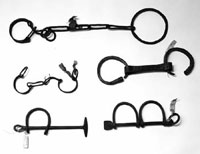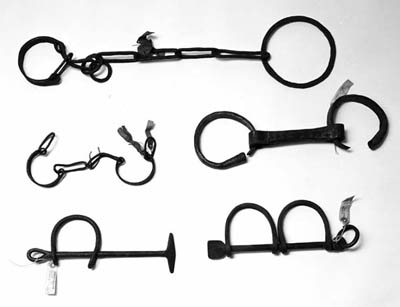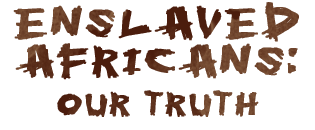
Kofi - Journey to the ship
One day we got to a great big house made from stone and everywhere were the white people uncle told me about. They are very hairy and smell funny to me. I held the Abeeku's hand and went down into a dark hole under the building. It was very hot and smelly and everyone in there was very angry. Men were shouting and fighting and then the white men came and shouted and hit everyone. I stayed close to Abeeku for many days. One day, just before we came here, he started to cry, so I cried, so the white men took us all to this place.
Read about journey to the ship for Okechukwu, Kwame and Oyeladun.
Shackles

Shackles which were used to restrain people. They allowed a few slavers to control many captives easily.
Felters - N83.1709
Big House
Once at the coast the Africans were often forced into a fort or a stockade. They often spent months in terrible conditions, waiting until a ship arrived to transport them.
Kofi's fort may have been at Elmina in Ghana. This fort was built by Portuguese traders in 1482 and became the largest slave trading post in the world.
White People
Many people, particularly those who did not live near the coast, may not have seen a white face before they were captured. Many would not have seen the ocean either.
Dark Hole
The coastal forts were terrible places. Captives were put in dark, stinking, and overcrowded dungeons. There was little food, water, light or air. Many died. Captives had no idea how long they would be there. Some stayed for five months.
Fighting
The coastal forts held people from many different places. Many of these people were at war in the outside world, and the fighting just continued in the fort.
Place
This place is the space in a ship where cargo is usually kept (the hold). Most of these ships had come from Europe and were trading in European goods, however, some were also travelling directly from the Americas, e.g. Brazil, British colonies in North America and Cuba. The ships' captains often gave gifts to local chiefs and paid taxes for the right to trade on their coast.


